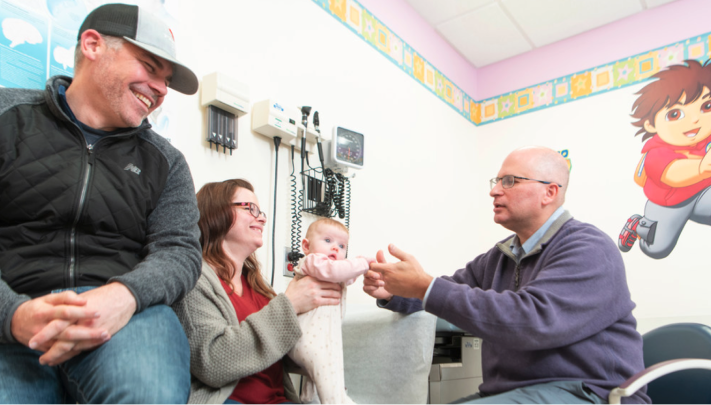- For Families
- Specialized Diets
- Caring for Colorectal Disorders
- Educational Videos
- Skin Care Guidelines
How do I care for my infant?
Newborns with colorectal disorders require care from specialists who understand the complexity of these particular conditions. Here is what you can expect as your newborn is evaluated and treated for their colorectal condition.
Newborn Evaluation
Most newborns with a colorectal disorder, such as an anorectal malformation or Hirschsprung disease, are evaluated and diagnosed within the first few days of life. Your child will also be checked for any other medical problems such as heart, lung or kidney problems. Once urgent evaluations have been made, your doctor will proceed with further diagnostic testing to find out more details about your child’s specific colorectal disorder. This may include an ultrasound of the spine, pelvis and abdomen. This advanced imaging can help surgeons determine an accurate diagnosis and treatment plan for your baby.
Preparing for Your Infants Treatment
Most babies with anorectal malformations, Hirschsprung disease or other severe colon and rectum problems will require several operations over time to restore optimal bowel function. The type of operation your baby will receive will depend on the severity of their condition. Your medical team will educate you on understanding all of your options for future bowel treatment and together you will engage in a shared decision-making process as you develop your infant’s long-term treatment plan.
Surgical treatment for your infant may involve the following procedures:
- Anal dilation
- Colostomy
- Pull-through procedure
- Colostomy closure
How do I care for my pre-school aged child and potty train?
Certain advanced diagnostic tests and treatments for children with bowel problems who are also potty training, helps them achieve continence and become free of soiling and accidents.
These tests and treatments include:
- Contrast enemas: A contrast enema is a type of X-ray that uses a special dye to visualize the inside of the colon. Contrast enemas can be performed on children who have had an anorectal malformation repaired or have undergone ostomy. Many of these children have issues with chronic constipation that needs treatment. This procedure helps to determine motility issues (how fast or slow the bowels are moving) and to see any areas of the colon that are diseased or damaged.
- Participation in a Bowel Management Program: Children who are experiencing soiling (encopresis) and fecal incontinence due to chronic constipation require a combination of therapies to improve bowel function. Pre-school children who are potty training tend to have very good results if they participate in a bowel management program for at least three to four months. Children in the program will gain the ability to wear normal underwear and take part in normal daily activities such as going to school, having playdates and enjoying an overall better quality of life. Our Bowel Management Program offers a combination of behavioral therapies, medication (such as laxatives to help soften and loosen stool), enemas, nutrition plans and child counseling services to ensure the best possible outcome for pre-school age children with incontinence issues.
How do I care for my school-age child?
This procedure is an option for older children who can successfully keep themselves clean and can manage the responsibility of administering enemas themselves. The procedure involves a surgeon creating a pathway or “valve” from the appendix to the belly button using the child’s own tissue. The valve is catheterized, allowing enema fluid to be administered into the colon to flush out stool. The procedure is performed using laparoscopic techniques (a minimally invasive surgical technique that avoids large incisions). Laparoscopic surgery allows for faster recovery times, shorter hospital stays and less pain.
About a month post-surgery, the catheter is removed and the child and parents are able to deliver the daily enemas through the valve to successfully flush the colon on their own. The valve remains hidden (but open) in the abdomen, allowing the child to bathe and shower freely.
How can my teen care for themselves?
As children grow older and become teenagers, it’s important for them to gain the skills and knowledge that will empower them to take control of their own healthcare needs. As part of our Bowel Management Program we help train and educate teenagers to perform their own self-care activities and become independent.
By the time your child is a teenager they should be able to:
- Make a doctors appointment
- Know which healthcare provider to contact regarding their symptoms and care
- Know how to properly take medication and fill prescriptions
- Manage their daily self-care routines
- Have an understanding of how insurance works and strategies for long-term healthcare needs
- Be connected to specialists such as gynecologists, urologists, gastroenterologists as well as any other physicians that adults




